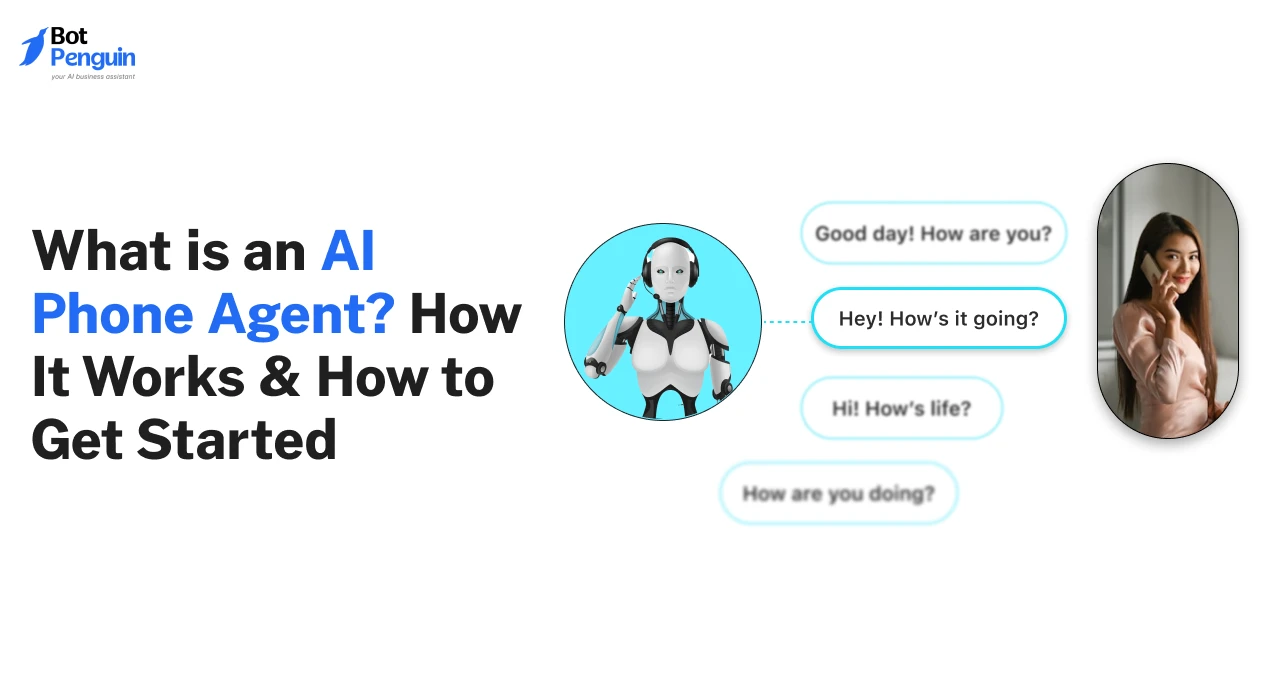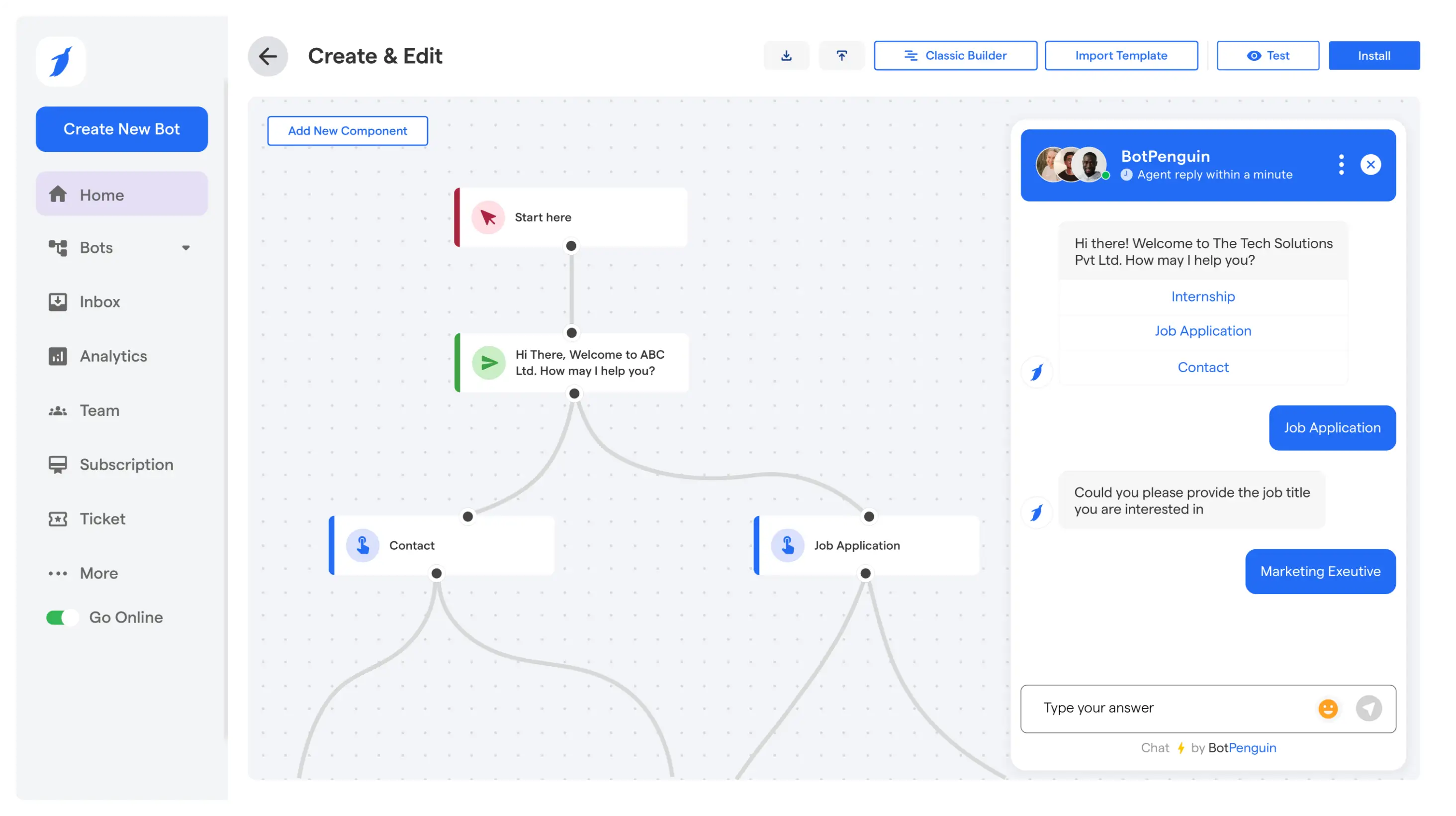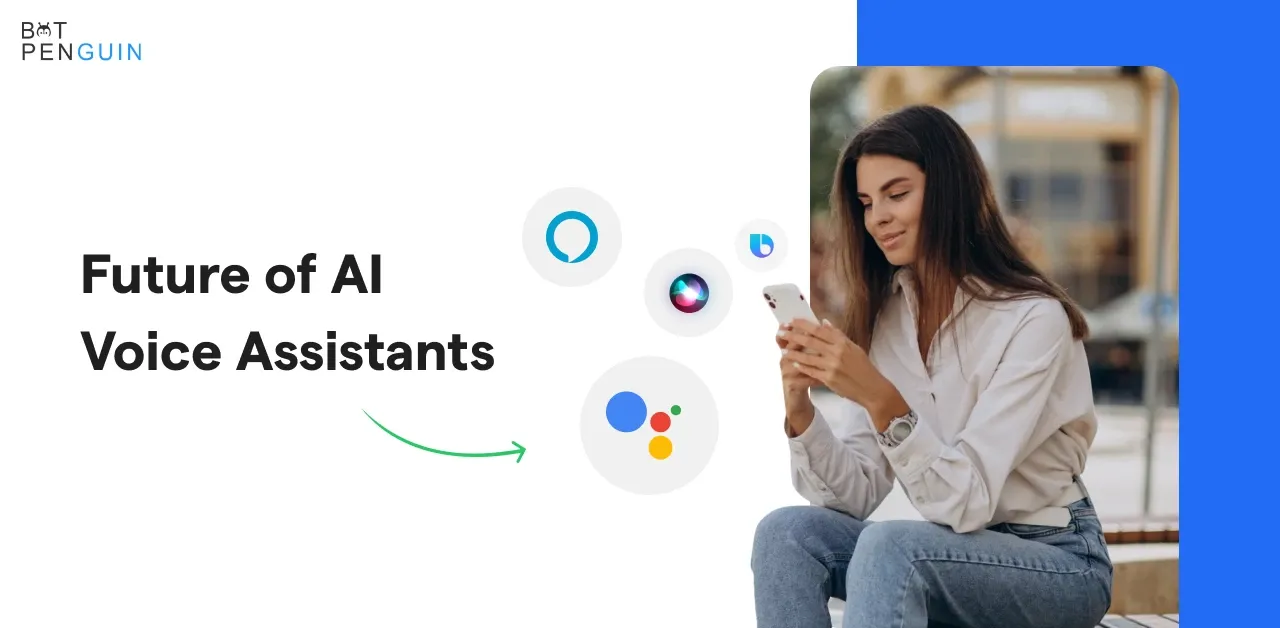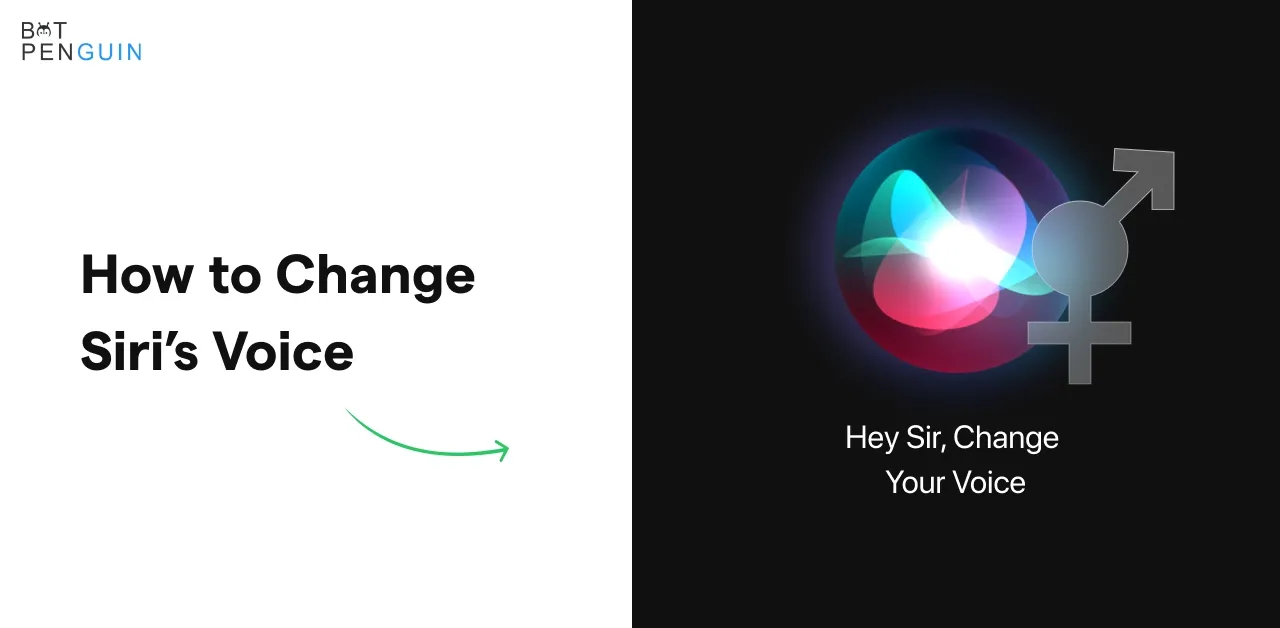Every missed call can mean a lost lead or an unhappy customer. Managing calls day and night is a challenge for growing businesses that rely on human agents alone.
More staff means higher costs, slower response times, and inconsistent experiences.
That is why many companies are turning to AI phone agents. These voice-based systems use artificial intelligence to handle inbound and outbound calls.
They understand what customers say, respond in real time, and take actions like booking meetings or recording queries.
An AI phone call agent can talk naturally, answer questions, and even follow up on requests. It ensures every customer gets help without waiting.
In this blog, we will explain what an AI phone agent is, how it works, its business benefits, and how you can easily get started using platforms like BotPenguin.
What is an AI Phone Agent?
An AI phone agent is an intelligent system that uses artificial intelligence to manage phone conversations with customers.
Instead of relying on a human to pick up every call, an AI phone agent can understand spoken language, respond naturally, and perform actions such as sharing information, scheduling appointments, or recording feedback.
It operates through advanced voice AI and natural language processing (NLP), enabling it to interpret what callers mean, not just what they say.
At its core, a phone AI agent listens to the caller’s message, processes it through NLP, and provides an accurate and conversational response. When connected with business tools like CRMs or ticketing systems, it can update records, create leads, or trigger notifications automatically.
This connection between voice AI and business logic allows companies to manage high volumes of calls without missing opportunities.
Unlike traditional IVR systems, which only follow preset menus such as “Press 1 for Support” or “Press 2 for Sales,” an AI phone call agent engages in real conversation.
It can understand context, answer open-ended questions, and switch topics smoothly. IVRs are rule-based; AI phone agents are intent-based. They adapt their replies based on the flow of the conversation.
Imagine a customer calling to confirm an order. The AI agent greets them by name, checks the order in the CRM, and replies, “Yes, your order is on the way and will arrive tomorrow.” It then asks if they would like to receive live tracking updates.
This entire process happens without any human intervention, ensuring speed, accuracy, and satisfaction.
By combining automation, personalization, and availability, AI phone agents are redefining how businesses handle customer communication.
How AI Phone Agents Work
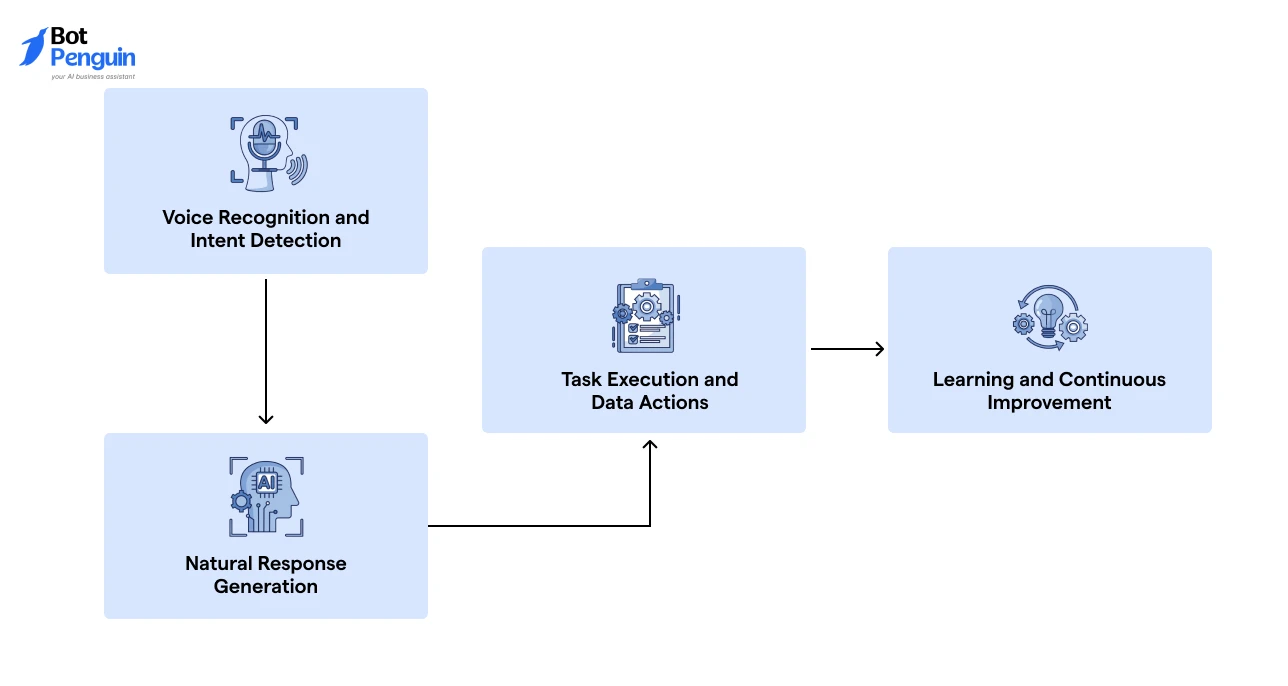
Now that we understand what an AI phone agent is, it is time to look at how it functions in real business scenarios.
These intelligent systems are designed to replicate the workflow of a trained human agent, but with automation, consistency, and real-time learning. They combine voice recognition, natural language processing, and data connectivity to perform tasks accurately and efficiently.
The working of an AI phone call agent can be divided into four main stages. Each stage is supported by artificial intelligence models that interpret, respond, and act in milliseconds.
1. Voice Recognition and Intent Detection
The process begins when a customer speaks. The AI agent phone uses speech recognition technology to convert spoken words into text. Natural language processing then identifies the intent behind the message.
For instance, if a customer says, “I want to reschedule my appointment,” the AI understands this as a request to modify a booking. It detects both the intent (rescheduling) and the context (appointment).
This first step forms the foundation for accurate conversation handling.
2. Natural Response Generation
Once intent is identified, the AI generates a clear and relevant response. Using pre-trained language models, the system crafts sentences that sound natural and human-like.
If the request was to reschedule, the AI might reply, “Sure, I can help with that. What new date and time would you prefer?” This immediate response keeps customers engaged while maintaining context.
3. Task Execution and Data Actions
The AI does more than reply. It performs backend tasks through integrated systems. If the business uses a CRM, ticketing tool, or calendar, the AI phone agent communicates with those tools through APIs.
Continuing the same example, after confirming the new schedule, it updates the CRM record automatically, sends a confirmation message, and closes the task without requiring manual input.
4. Learning and Continuous Improvement
Every interaction improves future performance. The system reviews outcomes, learns from corrections, and refines intent detection accuracy.
Over time, it starts understanding variations in speech, regional accents, and new customer phrases. This learning loop ensures better precision and faster responses.
A typical customer journey might look like this. A user calls to confirm an order. The AI answers, verifies the order in the system, provides an update, and asks if further help is needed. The entire exchange happens in less than thirty seconds with complete accuracy.
By combining these processes, AI phone agents transform traditional call management into intelligent communication. In the next section, we will explore how these capabilities translate into measurable business benefits.
Benefits of Using AI Phone Agents
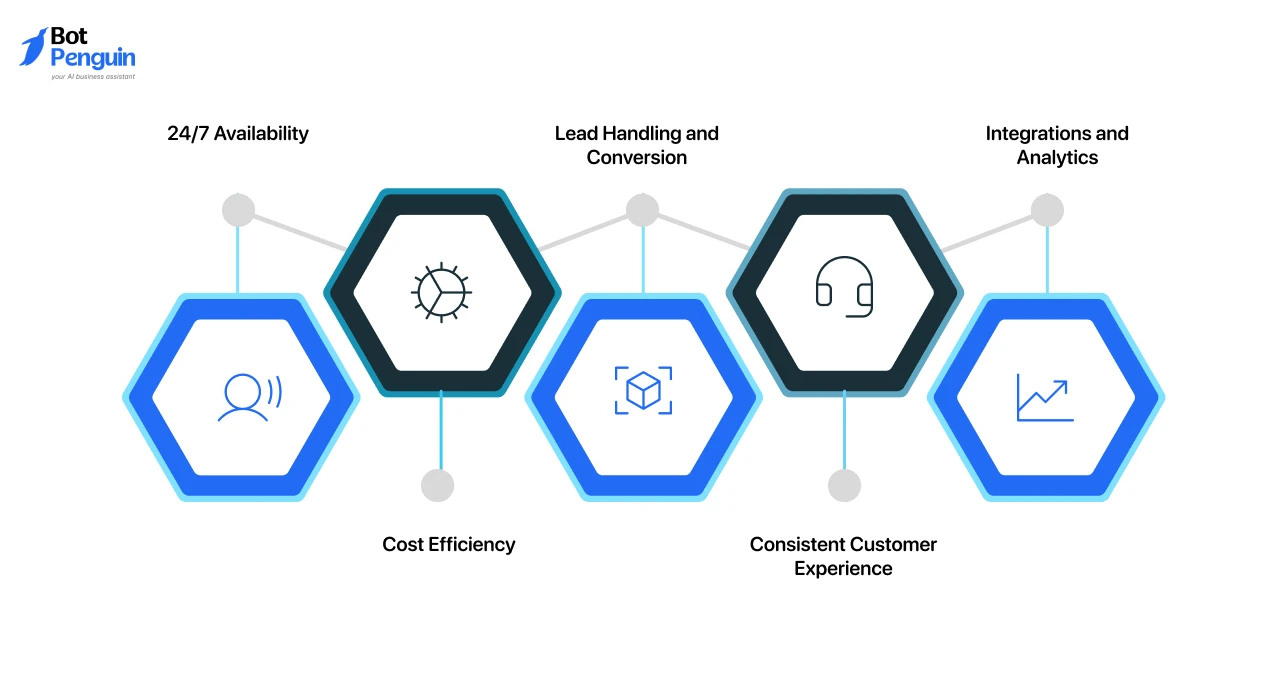
Understanding how AI phone agents function is only the beginning. Their true value lies in the measurable impact they deliver to businesses.
From improved customer service to reduced operational costs, these AI-driven systems provide practical, scalable advantages that make a visible difference in daily operations.
24/7 Availability
Customers expect instant support regardless of time zones or working hours. An AI agent phone never pauses operations. It answers inquiries, schedules appointments, and provides updates at any hour.
For instance, a logistics company can confirm shipment details for clients late at night, while a healthcare provider can assist patients with appointment reminders after hours.
This round-the-clock availability ensures customers always receive timely responses, building trust and reliability.
Cost Efficiency
Hiring and managing large support teams requires training, salaries, and infrastructure. An AI phone agent can handle hundreds of simultaneous calls with consistent accuracy.
This significantly reduces the cost per interaction while maintaining high service standards.
Businesses adopting AI-driven call handling often report lower call center expenses, improved response speed, and reduced dependency on manual staff during peak periods.
Lead Handling and Conversion
AI systems are capable of identifying and capturing qualified leads automatically. When a customer calls to ask about a product, the system records their interest, updates the CRM, and alerts the sales team instantly.
With automated follow-ups and reminders, businesses can convert more leads without increasing workload. This intelligent lead management ensures no potential sale goes unnoticed.
Consistent Customer Experience
Consistency in service builds credibility. Every caller interacting with an AI phone agent receives accurate information and professional communication.
Unlike human teams that can vary in tone or response, AI ensures that every conversation aligns with company standards.
This uniformity helps businesses maintain their brand image and deliver dependable experiences at scale.
Integrations and Analytics
Integration with business tools makes AI more powerful. When connected to CRM, ERP, or ticketing systems, the agent updates records instantly and generates detailed reports.
Analytics dashboards track call performance, response times, and satisfaction scores, enabling managers to refine operations based on real data rather than assumptions.
AI-powered phone systems bring measurable improvements in efficiency, scalability, and decision-making. They allow businesses to handle more customers, operate smarter, and use insights to improve continuously.
In the next section, we will explore real-world scenarios where these benefits are already transforming industries through AI phone agents in action.
Real-World Use Cases
The value of AI phone agents becomes evident when seen in action. Organizations across industries are using them to enhance customer engagement, automate operations, and improve conversion efficiency.
These use cases demonstrate how AI-powered voice systems fit into real business workflows and deliver tangible results.
1. Customer Support Automation
Customer service teams spend a major portion of their time addressing repetitive questions such as order status, payment verification, or technical assistance.
An AI phone call agent can automate these interactions by answering common queries, recording complaints, and routing complex issues to human agents.
Example: A telecom company can use AI to let customers check balance, update plans, or raise service tickets automatically. This improves first-call resolution rates and reduces call queues.
2. Appointment Scheduling
Service-driven sectors like healthcare, beauty, and maintenance rely heavily on timely scheduling.
A phone AI agent can confirm, reschedule, or cancel appointments based on customer input and real-time availability.
Example: A healthcare provider can automate appointment confirmation calls, send reminders, and capture cancellations through AI. The system updates the schedule instantly, reducing no-shows and optimizing resource utilization.
3. Lead Qualification
Sales teams often lose leads because of delayed follow-ups or incomplete profiling. An AI agent phone can qualify leads by asking pre-defined questions and updating CRM systems with relevant details.
Example: An automobile dealership can use AI to contact potential buyers, identify their preferred car model and budget range, and forward verified leads to the sales team. This shortens the sales cycle and improves conversion efficiency.
4. Post-Call Feedback Collection
Collecting feedback manually can be inconsistent and time-consuming. AI enables structured and automated feedback gathering after every call.
Example: A logistics company can deploy AI to contact customers post-delivery, request satisfaction ratings, and log feedback for analysis. These insights help management monitor service quality and customer experience trends.
5. Missed Call Management
Every missed call represents a potential lost opportunity. AI ensures follow-up actions occur automatically.
Example: A real estate agency can use AI to return missed calls within minutes, collect customer requirements, and share property details. This prompt engagement reduces lead drop-off and strengthens conversion opportunities.
These applications prove that AI phone agents are not limited to one department or industry. They bring measurable improvements in responsiveness, efficiency, and data accuracy across customer-facing operations.
In the next section, we will examine how these AI systems compare to traditional call center setups to understand the scale of improvement they provide.
How to Get Started with an AI Phone Agent
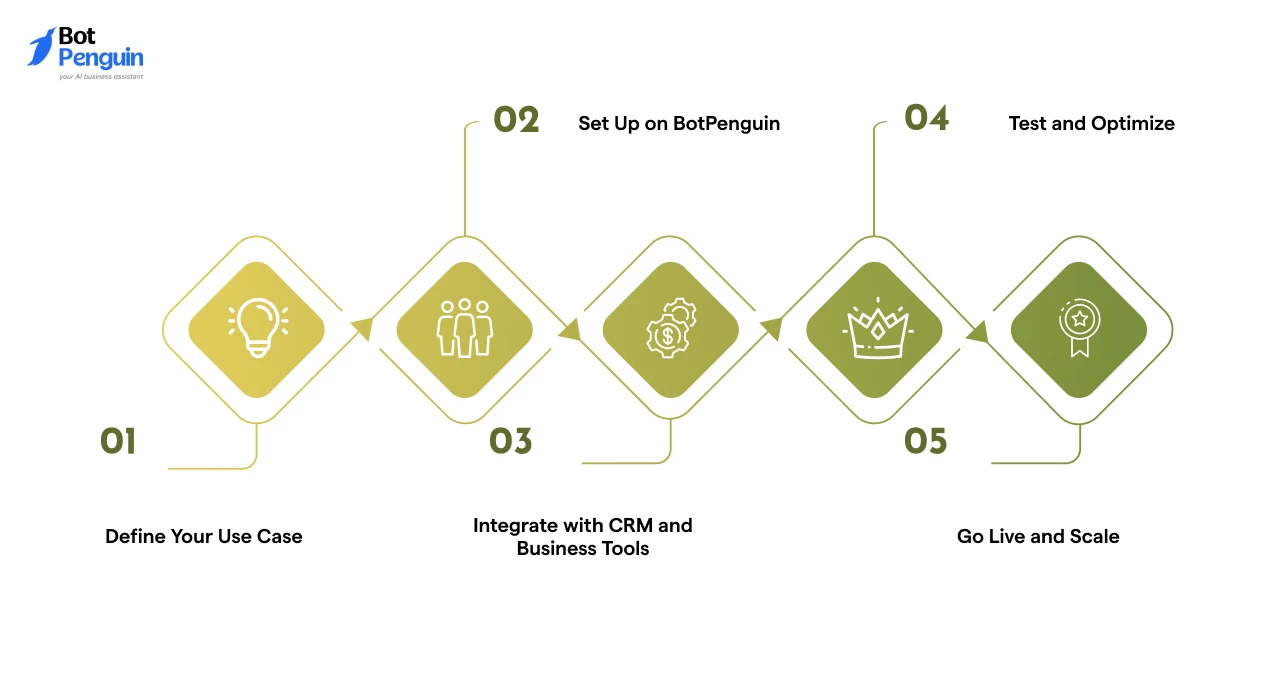
Adopting an AI phone agent does not require complex coding or a large technical team. With modern no-code platforms like BotPenguin, businesses can deploy intelligent calling systems in a matter of hours.
The process involves five key steps that move from planning to execution, ensuring that the AI system fits existing workflows and business goals.
Step 1: Define Your Use Case
The first step is to determine what the AI will handle. Identify the exact purpose for deploying an AI phone call agent. It could be to manage customer support, handle sales inquiries, or follow up on service requests.
For example, a service-based company might want the AI to handle appointment calls, while an eCommerce business might use it for order tracking. Defining a clear use case ensures the system is trained to perform the right actions from day one.
Step 2: Set Up on BotPenguin
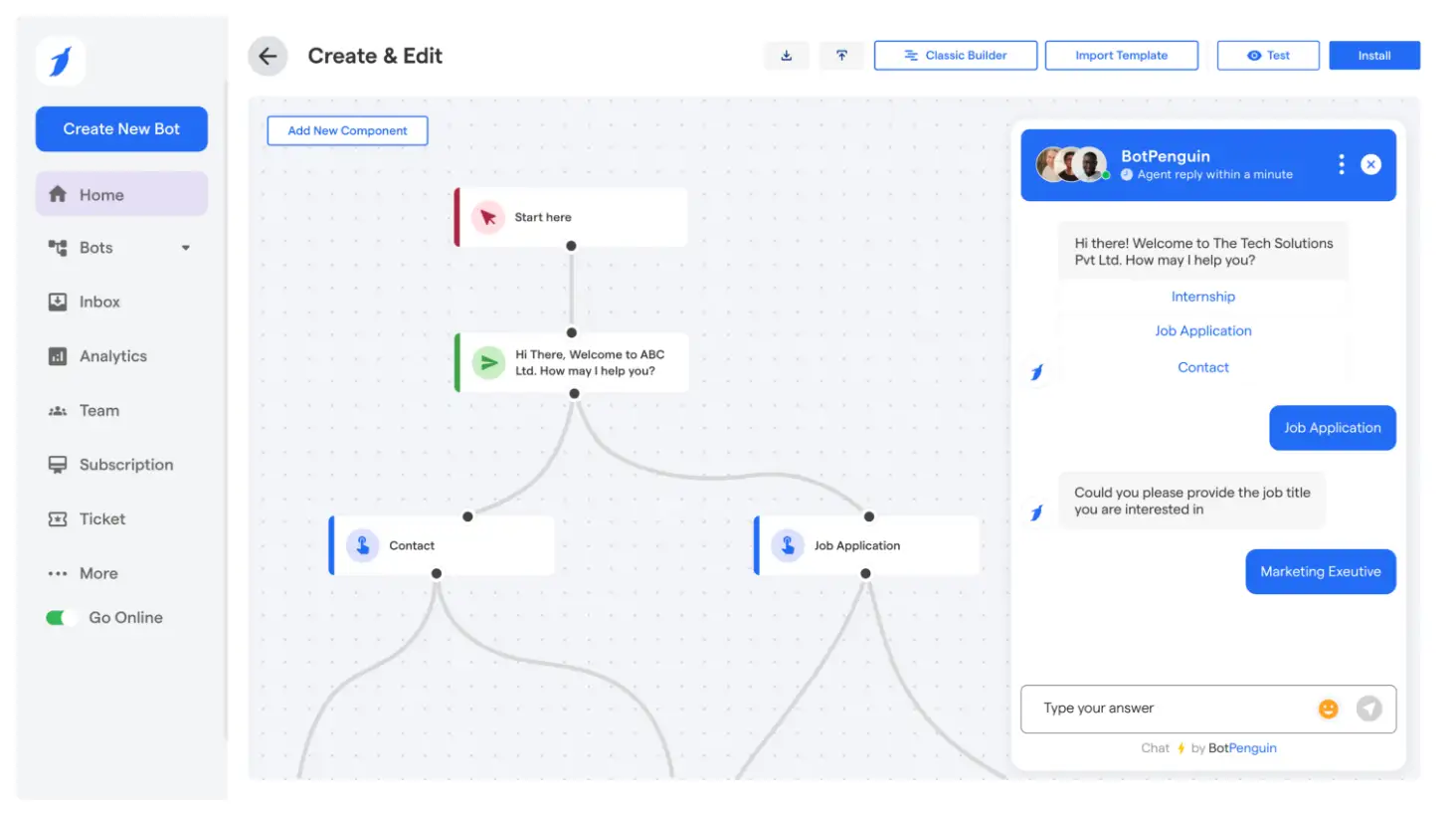
Once the goal is defined, log into BotPenguin and select the AI Phone Agent feature. The platform provides a guided, no-code setup process that allows users to configure their agent quickly.
Choose your preferred voice type, language, and greeting tone. You can also define the AI’s behavior, such as how it responds to customer intents or handles follow-up questions.
The setup is fully visual, so teams can customize without technical assistance.
Step 3: Integrate with CRM and Business Tools
Integrations make the AI truly useful. BotPenguin connects with more than eighty tools, including HubSpot, Zoho, Salesforce, and Google Workspace.
Once connected, the phone AI agent can automatically log leads, update customer records, or create tickets.
This integration ensures that every interaction becomes actionable data, improving accuracy and accountability across teams.
Step 4: Test and Optimize
Before activating live calls, test your agent thoroughly. BotPenguin provides a simulation mode where you can review how the AI agent phone interprets speech, identifies intent, and executes tasks.
Analyze call reports to identify weak points, adjust responses, and refine workflows. Testing ensures that once the system goes live, it performs reliably and aligns with customer expectations.
Step 5: Go Live and Scale
After testing, activate the AI agent to start handling real customer calls. From the dashboard, monitor live performance metrics such as response accuracy, call volume, and resolution time.
As results improve, you can expand usage to multiple departments or create multilingual agents for wider customer coverage. Scaling is instant since no additional infrastructure is required.
By following these steps, businesses can deploy and scale AI-driven calling systems without technical complexity. BotPenguin AI phone agent combines simplicity with enterprise-grade reliability, helping companies automate communication efficiently and save valuable time.
Metrics to Measure Success
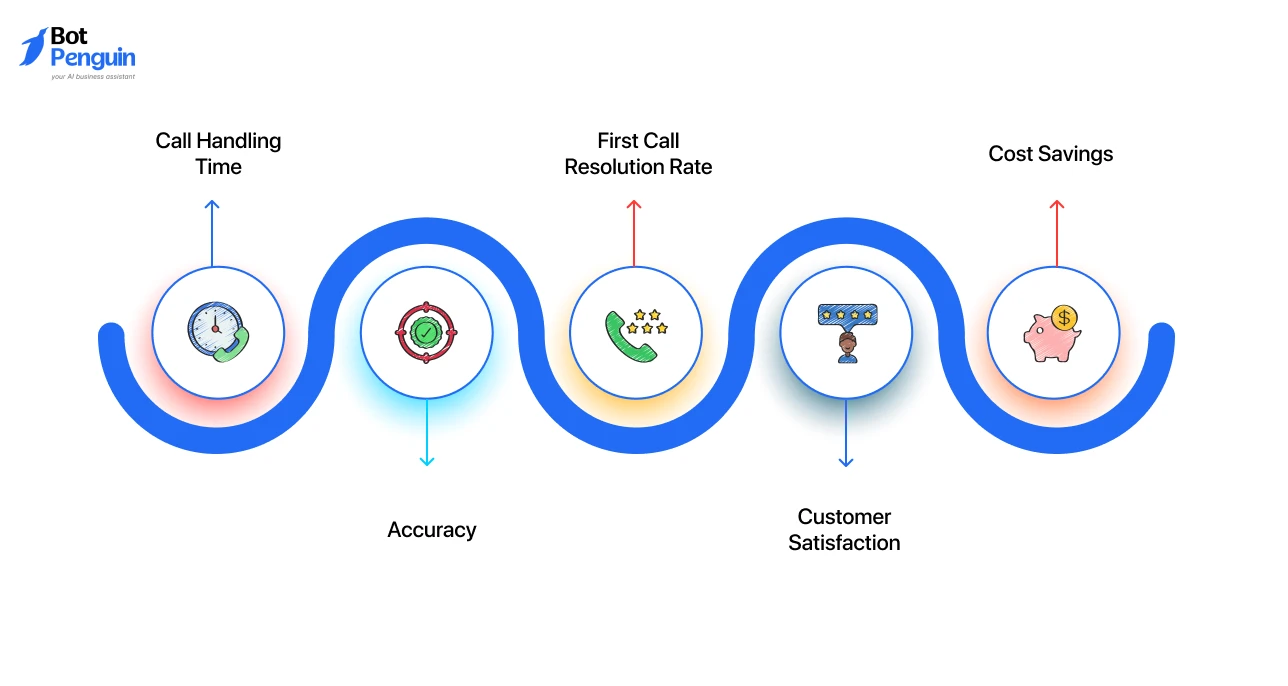
Deploying an AI phone agent is only the first step. Measuring its effectiveness determines whether the automation is meeting business expectations.
These performance metrics help evaluate customer experience, system accuracy, and financial outcomes. Regular monitoring also ensures the AI continues to adapt and deliver consistent value over time.
Call Handling Time
This metric measures how long the AI takes to process and complete a conversation. Efficient systems handle queries within seconds, showing that the AI phone call agent understands intent quickly and resolves issues without unnecessary dialogue.
Comparing current call duration to pre-automation averages provides a direct indicator of time saved and agent productivity. Shorter handling times mean faster support cycles and higher call throughput.
Accuracy
Accuracy reflects how effectively the AI interprets user intent and provides correct answers. It includes understanding accents, tone, and contextual meaning.
A high accuracy percentage shows that your AI agent phone is processing data and responding precisely to customer needs.
Regular review of incorrect or misunderstood responses helps retrain the model for better performance over time.
First Call Resolution Rate
This KPI determines how often an inquiry is resolved during the first interaction. When AI consistently provides complete solutions without escalation, customers experience fewer transfers and quicker outcomes.
An upward trend in this metric confirms that the system is becoming more capable of handling end-to-end communication independently.
Customer Satisfaction
Post-call surveys and sentiment analysis provide direct feedback on AI quality. Tracking satisfaction scores gives a realistic measure of how well the automation aligns with customer expectations.
A consistent satisfaction score above eighty percent usually indicates strong AI phone agent performance.
Cost Savings
Cost optimization is one of the most measurable results of AI adoption. Comparing pre- and post-deployment costs reveals clear savings from reduced staffing, shorter calls, and fewer repeated interactions.
Businesses often achieve a noticeable reduction in call center expenditure within the first few months.
Together, these AI agent phone metrics highlight how automation affects productivity, accuracy, and profitability. Tracking them regularly helps businesses maintain AI reliability while maximizing operational return.
Final Thoughts
The rise of AI phone agents marks a major shift in how businesses manage communication. They have evolved from being optional add-ons to essential tools that support operations, enhance customer engagement, and reduce dependency on large human teams.
By combining automation with intelligence, companies can maintain responsiveness, improve accuracy, and make every customer interaction productive.
The measurable impact in cost reduction, faster resolution times, and improved satisfaction makes AI-driven communication a competitive advantage for every organization.
For businesses ready to begin, BotPenguin AI phone agent offers a reliable, no-code solution to get started quickly.
It integrates effortlessly with CRMs, supports real-time analytics, and enables scaling without infrastructure challenges. From handling inbound calls to automating lead follow-ups, it helps teams deliver consistent service with measurable ROI.
Start exploring how BotPenguin can bring AI-powered efficiency to your communication strategy and prepare your business for the next stage of intelligent customer interaction.
Frequently Asked Questions (FAQs)
How secure are AI phone agents for handling customer information?
AI phone agents follow strict data security standards, including encryption and compliance with privacy frameworks like GDPR and SOC 2, ensuring customer data remains protected and confidential.
Can AI phone agents support multiple languages for global customers?
Yes, advanced AI phone systems support multilingual interactions, enabling businesses to communicate with customers across different regions and languages while maintaining context and accuracy throughout each call.
How do AI phone agents integrate with existing customer service software?
AI phone agents connect through APIs or built-in integrations with tools like CRMs, help desks, and ticketing systems, enabling synchronized data sharing and automated workflow execution in real time.
What industries benefit most from adopting AI phone agents?
Industries like healthcare, eCommerce, real estate, logistics, and finance use AI phone agents to automate appointments, support requests, lead management, and feedback collection for improved operational efficiency.
How often should AI phone agent performance be reviewed?
Performance should be reviewed monthly to evaluate accuracy, call handling time, and satisfaction scores, ensuring continuous optimization and alignment with evolving customer service requirements.
